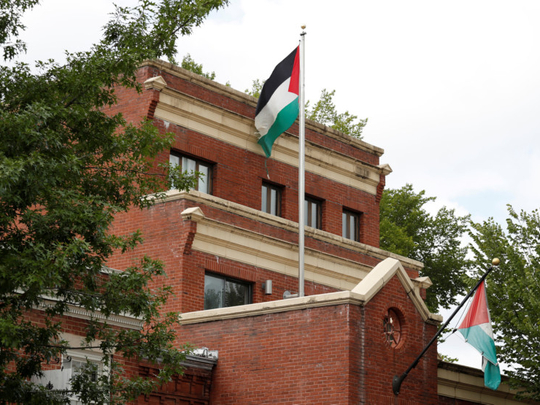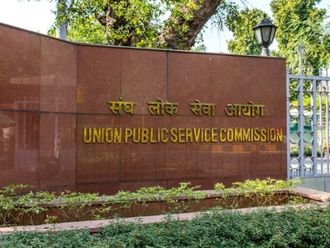
The plaque on the wall of the red-brick office building at 1732 Wisconsin Avenue, just a few blocks from the famed Washington Cathedral, dubbed “spiritual home of the nation”, identifies its now all but departed tenants: General Delegation of the Palestine Liberation Organisation (PLO) to the United States.
In contrast to the urban bustle around it, the building looks forlorn, the Palestinian flag hangs limply from a pole, the lobby is deserted, the staff, once numbering 20, is now skeletal, and the email system shut down — all because of an order by the administration that all activities there cease by September 13 (tellingly, the 25th anniversary of the signing of the Oslo Accord) and the office vacated by October 10. The order: You have 30 days to get out. So get on with it.
The PLO envoy, Hussam Zomlot, who had had his, his wife’s and his children’s visas cancelled by the US State Department, is already back in the West Bank, trafficking in overweening platitudes about how the order to shut down his office “will have severe consequences”. Earlier, giving the American administration’s reason for ordering the closure, a State Department official explained, in a statement worded to resemble a diplomat’s bland pabulum, that “the Palestinians have not taken steps to advance the start of direct and meaningful negotiations with Israel”.
To be sure, the PLO office in Washington has always had a checkered history since it first opened for business, tentatively, in the late 1970s — chequered not only in terms of its relations with the government and the media, but also in terms of its value — or lack thereof — to the cause of Palestine. Its first director, the late Hatem Hussaini, was neither adept as a diplomat nor was he, by any stretch of the imagination, media savvy.
A case in point? Once, responding to complaints by Arab Americans that the press in the US was biased against Palestinians, a network station invited the PLO director to meet, on air, with a panel of five print journalists and there challenge them about the issue. The man, very simply, never took the trouble to prepare for the event. The end result was that we saw him ask jejune questions, such as:
“Why don’t you in your reporting support Palestinian rights?”
“It’s not our job to do that,” came the inevitable response. “Next question.”
Members of the Arab American community watching the spectacle cringed.
Then there was the time Hussaini was interviewed by Ted Koppel on ABC’s Nightline, where he blurted out that there were contacts between American government officials and the PLO, as indeed there had been, though they were meant to be kept under the table. It was then time for the PLO in Tunis to cringe — and the indiscreet Hussaini was “transferred”, to be replaced by one Hassan Abdul Rahman, who, in addition to being inarticulate, did not altogether fit into the image of a photogenic revolutionary, given his bald head, ample girth and perpetual five o’clock shadow — not to mention the fact that the man went around the country giving the same lecture, much in the manner of a politician delivering a stump speech, that he repeated verbatim, whether he addressed a church group or a student body.
Then, out of the blue, disaster struck under his watch.
In September 1987, impatient with the PLO’s reluctance to accept UN Resolution 242 as a basis for peace negotiations, the then US president, Ronald Reagan, struck. The then US secretary of state George Shultz ordered the group’s office in Washington closed “within 30 days” — sounds familiar, no? — stating that “the action is being taken to demonstrate US concerns over terrorism committed and supported by organisations and individuals affiliated with the PLO”. In short, you do it our way, or you hit the highway.
By the end of the following year, in December 1988, the PLO gave in, ate humble pie, took it on the chin, and shifted gears. Resolution 242 it shall be. In addition to being allowed to reopen their office in the American capital, the PLO was rewarded with talks between their officials and diplomats from the American embassy in Tunis.
If Palestinian activists in the US — and there are quite a few of these still buzzing around the country — are angered by the recent punitive move against their “delegation” in Washington, it is because they see it as a slap on the face of their sense of peoplehood. Not because they for one moment believe they are losing valuable representatives who had expertly promoted their cause in the US. Diplomatic expertise has never been the metier of PLO officials.
How could these activists, for example, forget all those disastrous appearances on CBS’s 60 Minutes by Yasser Arafat, when he was put through the wringer by the crafty Mike Wallace, appearances where the Palestinian leader, not having earlier prepared for the interview — opting to answer questions off the cuff — reduced his stature, and by definition his people’s, to a fragment. Let me share this recollection with you. While accompanying the former PLO chairman on his private jet, a Falcon, in January 1987, as he flew to Kuwait for the opening of the Islamic Conference Organisation meeting, with the expectation of writing a long piece about him for the Critique magazine, I broached the subject, as gingerly as possible, reminding him that even American presidents prepare before holding a press conference or sitting for an interview, studying potential questions that his aides believe journalists may ask. Try it, I suggested, again gingerly. And he responded, mock-seriously: “Come on now, brother, you want to send me back to school?”
No, Palestinian leaders do not prepare. Even in the unlikely event that they had aides savvy in the intricate ways of the media, these aides would not speak up. Palestinian leaders expect a respectful hearing, not blunt advice from their aides. No, they don’t welcome or listen to advice, I say. They don’t prepare. And they don’t do a good job.
Are we Palestinians sad to see that red-brick building on Wisconsin Avenue shut down? I for one am glad, not sad, that these folks, after being given a 30-day notice to leave, have already lifted anchor and sailed away. They had done our cause more harm than good.
Fawaz Turki is a journalist, lecturer and author based in Washington. He is the author of The Disinherited: Journal of a Palestinian Exile.








